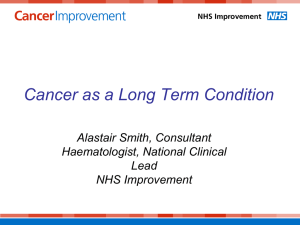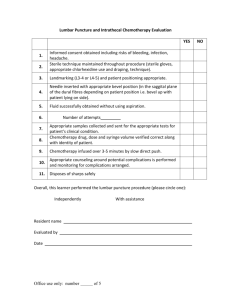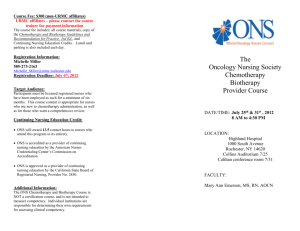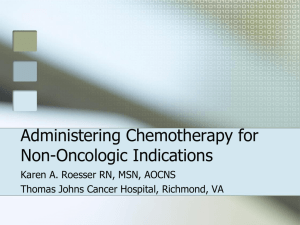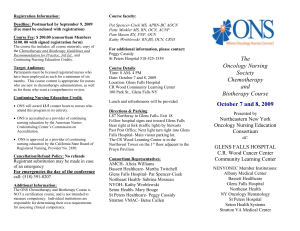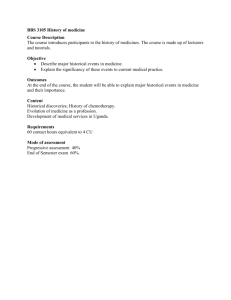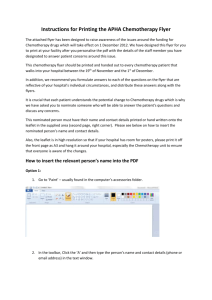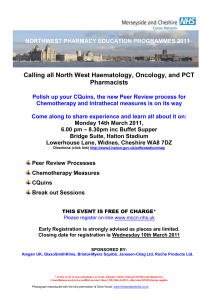Continuing Education Credit - Boston Children`s Hospital
advertisement
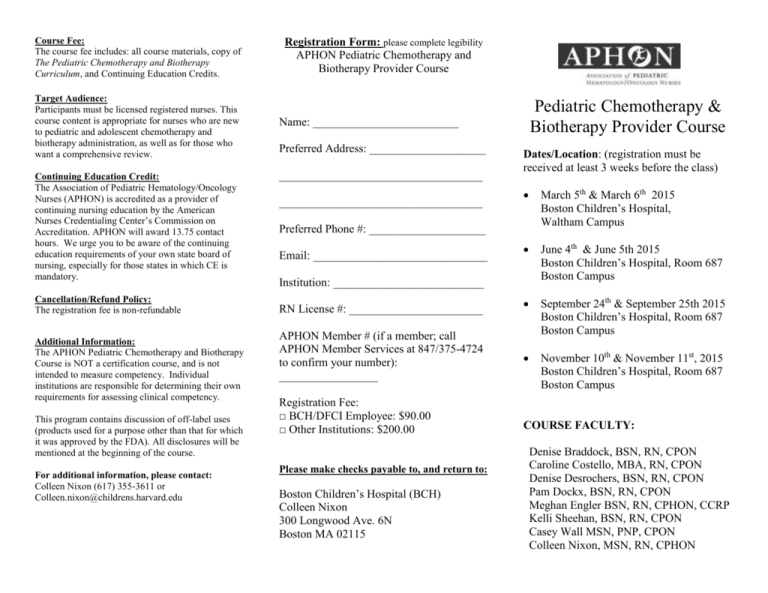
Course Fee: The course fee includes: all course materials, copy of The Pediatric Chemotherapy and Biotherapy Curriculum, and Continuing Education Credits. Target Audience: Participants must be licensed registered nurses. This course content is appropriate for nurses who are new to pediatric and adolescent chemotherapy and biotherapy administration, as well as for those who want a comprehensive review. Continuing Education Credit: The Association of Pediatric Hematology/Oncology Nurses (APHON) is accredited as a provider of continuing nursing education by the American Nurses Credentialing Center’s Commission on Accreditation. APHON will award 13.75 contact hours. We urge you to be aware of the continuing education requirements of your own state board of nursing, especially for those states in which CE is mandatory. Cancellation/Refund Policy: The registration fee is non-refundable Additional Information: The APHON Pediatric Chemotherapy and Biotherapy Course is NOT a certification course, and is not intended to measure competency. Individual institutions are responsible for determining their own requirements for assessing clinical competency. This program contains discussion of off-label uses (products used for a purpose other than that for which it was approved by the FDA). All disclosures will be mentioned at the beginning of the course. For additional information, please contact: Colleen Nixon (617) 355-3611 or Colleen.nixon@childrens.harvard.edu Registration Form: please complete legibility APHON Pediatric Chemotherapy and Biotherapy Provider Course Pediatric Chemotherapy & Biotherapy Provider Course Name: _________________________ Preferred Address: ____________________ ___________________________________ ___________________________________ Dates/Location: (registration must be received at least 3 weeks before the class) March 5th & March 6th 2015 Boston Children’s Hospital, Waltham Campus June 4th & June 5th 2015 Boston Children’s Hospital, Room 687 Boston Campus September 24th & September 25th 2015 Boston Children’s Hospital, Room 687 Boston Campus November 10th & November 11st, 2015 Boston Children’s Hospital, Room 687 Boston Campus Preferred Phone #: ____________________ Email: ______________________________ Institution: __________________________ RN License #: _______________________ APHON Member # (if a member; call APHON Member Services at 847/375-4724 to confirm your number): _________________ Registration Fee: □ BCH/DFCI Employee: $90.00 □ Other Institutions: $200.00 Please make checks payable to, and return to: Boston Children’s Hospital (BCH) Colleen Nixon 300 Longwood Ave. 6N Boston MA 02115 COURSE FACULTY: Denise Braddock, BSN, RN, CPON Caroline Costello, MBA, RN, CPON Denise Desrochers, BSN, RN, CPON Pam Dockx, BSN, RN, CPON Meghan Engler BSN, RN, CPHON, CCRP Kelli Sheehan, BSN, RN, CPON Casey Wall MSN, PNP, CPON Colleen Nixon, MSN, RN, CPHON General Information The Association of Pediatric Hematology/Oncology Nurses (APHON) Pediatric Chemotherapy and Biotherapy Provider Course provides a comprehensive review of the knowledge needed to administer cytotoxic and biotherapeutic agents. Upon successful completion of the course and posttest, participants will receive an APHON Pediatric Chemotherapy and Biotherapy Provider Card. This card validates that the participant has completed the education and demonstrated the knowledge needed to administer chemotherapy and biotherapy agents to pediatric patients. It is the responsibility of the participant to ensure their provider status is renewed with APHON every 2 years on or before the provider card expiration. Information regarding the online renewal process is found on the APHON website at www.aphon.org. Course Objectives 1. Upon completion of the course, the participant will be able to: 2. Establish education and practice standards for the administration of chemotherapy and biotherapy to children and adolescents. 3. Promote consistent practices in the administration of chemotherapy and biotherapy to pediatric and adolescent patients. 4. Describe the characteristics of the cancer cell. 5. Identify differences between cancers in adults and cancers in children. 6. List cancer treatment modalities and how response is measured. 7. Discuss the history of chemotherapy. 8. Describe the development of the specialty in childhood cancer treatment. 9. Identify principles for cancer research and informed consent and the role of the nurse. 10. Describe important principles of pharmacokinetics in chemotherapy administration. 11. Discuss classes of chemotherapeutic agents. 12. Define combination chemotherapy. 13. List modes of chemotherapy delivery. 14. Identify biotherapeutic agents. 15. Describe indications and actions of commonly used medications. 16. Identify side effects and nursing interventions for specific biotherapy agents. 17. Recognize classifications for chemotherapeutic agents. 18. Identify common side effects for individual medications. 19. Describe nursing interventions for chemotherapy medications. 20. Describe the occupational exposure risks of chemotherapy/biotherapy. 21. List components of safe handling and disposal practices. 22. Identify components of personal protection equipment. 23. Identify components of pretreatment assessment. 24. List steps in preparation of chemotherapy. 25. Identify nursing measures for different routes of administration. 26. Describe special considerations for vesicant chemotherapy. 27. Identify the type and management of allergic, anaphylactic, and hypersensitivity reactions. 28. Describe required family teaching prior to chemotherapy administration. 29. Identify common side effects of chemotherapy by organ systems. 30. Describe nursing assessment and interventions for common toxicities. 31. List expected medical interventions for each toxicity. 32. Define late effects. 33. Describe examples of late effects by body system. 34. Define quality of life for patients receiving chemotherapy. 35. Describe risk factors for adherence to therapy. 36. Identify unique concerns for adolescents and young adults. 37. Discuss how culture influences patient and family response to chemotherapy. 38. Describe the ethical principles associated with clinical trials. 39. Identify the nurse’s role in informed consent. 40. Discuss legal issues related to chemotherapy administration. Program Content 1. 2. 3. 4. 5. 6. 7. 8. 9. 10. 11. 12. 13. 14. Introduction and Standards General Cancer Overview Chemotherapy Overview Principles of Chemotherapy Principles of Biotherapy Chemotherapy: Agents and Classifications Safe Handling of Chemotherapy and Biotherapy Agents Administration Considerations Toxicity and Symptom Management Late Effects of Chemotherapy Psychosocial Issues Ethical and Legal Considerations Case Studies Exam/Evaluations
